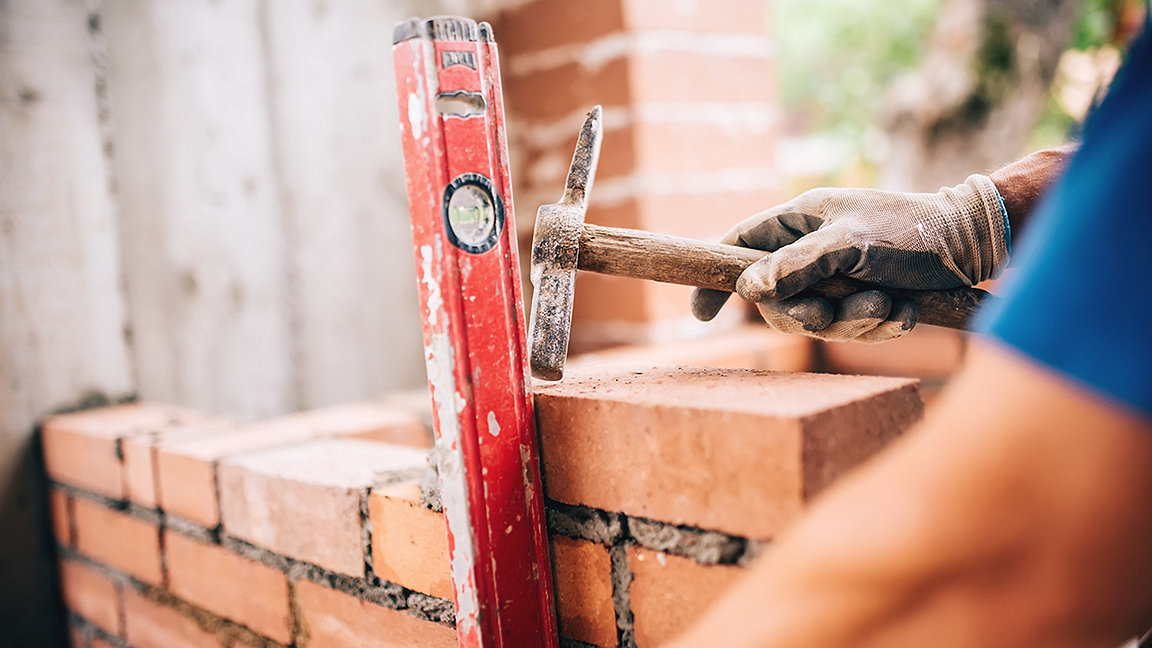
Some might argue that bricklaying was in my blood: my journey into the construction industry began many years before I was even born.
My great-grandfather worked as a bricklayer in the south of England, rebuilding bomb-damaged buildings during and after the Second World War. My grandfather worked alongside him learning his trade, and then my father in turn learnt from his father.
Despite this obvious path into the construction industry, I opted to go to college first. I wanted to broaden my horizons and gain some UCAS points in case bricklaying was not what I had hoped it would be, and I took a BTEC in sports performance and excellence. But after finishing college, I did not feel inspired by the prospect of going to university. So I became the fourth generation of bricklayer in the family.
I found myself working on site – or on the tools, as we say in the trade – between the ages of 21 and 25. I started as a labourer, and worked my way up to being on the trowel – again, a trade term – alongside my father. Together, we did a variety of private residential jobs in Hampshire, giving me particular insight into modern construction methods and technologies.
Practical experience and professional role
After four years working on site, however, I was finding the job increasingly frustrating. Not only did I have to battle against the great British weather, I was suffering from physical issues resulting from a bad knee injury as a teenager and a more recent skiing accident. These made it extremely challenging to earn a consistent living.
So I decided to explore whether I could transfer my construction knowledge into a professional role. I'd asked my father about what I might do after bricklaying, and he suggested building surveying. After some deliberation, I thought that this would be an interesting and varied career to which I could apply my practical experience.
I attended an open day at Southampton Solent University, where I met a senior building surveying professional who was lead lecturer for all construction-related courses. He introduced me to the idea of a degree apprenticeship.
Savills, which was at that stage one of the few companies offering such a programme, happened to contact the university a week later asking whether there were any candidates who would be interested in a building surveying apprenticeship. In the south of England, the company runs these with the University College of Estate Management (UCEM) in Reading. I decided to apply.
As the interview would be my first for a professional role, I had concerns over what impression I would make, and whether I would fit the mould of a corporate building surveyor. My approach was to be as authentic as possible and draw on my practical industry experience during the interview. To my surprise, I was offered the post.
Overcoming professional challenges
At first, I had my doubts about whether I would be able to adjust to the new corporate environment while studying for my building surveying degree, both of them a far cry from the building site. However, following some encouraging marks for my early coursework and positive comments from my new colleagues, I quickly settled into the role and began to thrive, with a renewed sense of direction.
I was certainly keen to impress – although I was not always successful. In my second week at Savills, my director organised a lunch for a senior colleague who was leaving the company. I was sitting at the table, nervously trying to make a good impression, and reached for a bottle of mayonnaise. Unbeknown to me, though, the nozzle was blocked. When I squeezed it the top flew off and covered everyone with the contents. While nothing this bad has happened since – and I do enjoy a networking lunch – I am still hesitant to reach for the sauce!
Other than condiments, the hardest challenge I faced in the early stages was overcommitting myself to work alongside my studies. In hindsight, I see this was also a result of my being eager to impress, and a naivety about how long tasks actually take. I also found it hard to say no to senior colleagues when they asked for my help.
As I have increased in experience I have more of an idea about the time needed to complete tasks, and I now organise my diary much better. I have also learnt to be stricter with colleagues about ringfencing my study day. I now put my out-of-office autoreply on, so they know that I will not respond to messages on those days.
Applying classroom learning to work
Dedicating time to my studies has in turn benefited my professional practice. My first year and a half at university consisted of general modules on topics such as property and land law, people and organisational management, finance and resource management, and economics. All of these were new to me, and provided me with useful knowledge as I started to take more responsibility in my job and interact directly with clients.
Recent modules have been more specific to building surveying, covering subjects such as framed structures, design and environmental science, project and cost control, and construction technology. I have enjoyed these as they tie directly into the work I am doing at Savills, whether that be preparing a specification of works, managing a contract, or surveying a building and reporting to clients.
I am now more than halfway through my degree apprenticeship, and three years into my building surveying degree with UCEM. Most of my grades have been in the first-class bracket, and the experience has been exactly what I had hoped.
I am completing my degree course online, being entitled to one study day a week to work on my current modules and watch live or pre-recorded lectures. The rest of the working week is spent alongside chartered building surveyors in the Savills southern region building and project consultancy team.
As someone who learns best through a hands-on approach, the apprenticeship has been a perfect way to train on the job, under the tutelage of some experienced and talented surveyors.
Alongside my degree, I have also been working hard to prepare for my APC, and keeping my logbook since March last year. I have recently put my studies and APC preparation on hold, though, so I can get married and enjoy a year of many more weddings among friends and family. I will still finish my degree in 2023, and aim to complete my APC the following year.
It's been an enjoyable experience so far and, looking back, I think changing careers was a great decision. Provided I pass, it would mark the end of my apprenticeship – and the start of my journey as a chartered building surveyor.
'Dedicating time to my studies has in turn benefited my professional practice'

